复旦研究生英语Unit Seven
研究生英语阅读翻译下unit7

New varieties of rice and other crops, resistant to insects and disease ,will have replaced those cultivated today. Farmers will no longer lose substantial proportions of the less developed countries. Health benefits will also come from plants genetically engineered to be more balanced nutritionally than those that have evolved through natural selection or been bred by traditional methods.
the margin of error, are correspondingly
reduced.
翻译:从一种植物到另一种植物,生物技术允许单个基
因精确地移动。很容易了解到,一个基因在其新的环境 将如何进行工作的。意想不到的可能的结果以及误差是 相应地在减少。 •疑问:The likelihood of unexpected consequences, and the margin of error, are correspondingly reduced. •这句话怎么翻译? unexpected consequences, the margin
如果研究和发展被允许继续下去,所有产品 都将会增值。
疑问:the products will be there for all to appreciate— —是指产品会增值还是指产品会被人们所欣赏?
研究生新阶英语阅读 Unit 7 原文
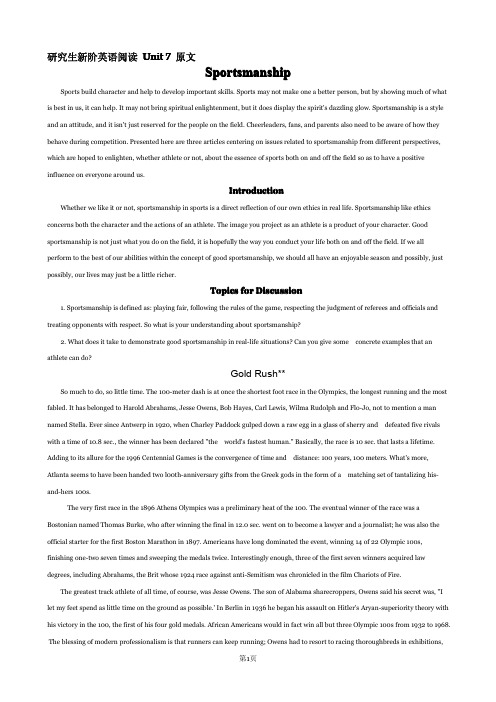
研究生新阶英语阅读Unit7原文SportsmanshipSports build character and help to develop important skills.Sports may not make one a better person,but by showing much of what is best in us,it can help.It may not bring spiritual enlightenment,but it does display the spirit's dazzling glow.Sportsmanship is a style and an attitude,and it isn't just reserved for the people on the field.Cheerleaders,fans,and parents also need to be aware of how they behave during competition.Presented here are three articles centering on issues related to sportsmanship from different perspectives, which are hoped to enlighten,whether athlete or not,about the essence of sports both on and off the field so as to have a positive influence on everyone around us.IntroductionWhether we like it or not,sportsmanship in sports is a direct reflection of our own ethics in real life.Sportsmanship like ethics concerns both the character and the actions of an athlete.The image you project as an athlete is a product of your character.Good sportsmanship is not just what you do on the field,it is hopefully the way you conduct your life both on and off the field.If we all perform to the best of our abilities within the concept of good sportsmanship,we should all have an enjoyable season and possibly,just possibly,our lives may just be a little richer.Topics for Discussion1.Sportsmanship is defined as:playing fair,following the rules of the game,respecting the judgment of referees and officials and treating opponents with respect.So what is your understanding about sportsmanship?2.What does it take to demonstrate good sportsmanship in real-life situations?Can you give some concrete examples that an athlete can do?Gold Rush**So much to do,so little time.The100-meter dash is at once the shortest foot race in the Olympics,the longest running and the most fabled.It has belonged to Harold Abrahams,Jesse Owens,Bob Hayes,Carl Lewis,Wilma Rudolph and Flo-Jo,not to mention a man named Stella.Ever since Antwerp in1920,when Charley Paddock gulped down a raw egg in a glass of sherry and defeated five rivals with a time of10.8sec.,the winner has been declared"the world's fastest human."Basically,the race is10sec.that lasts a lifetime. Adding to its allure for the1996Centennial Games is the convergence of time and distance:100years,100meters.What's more, Atlanta seems to have been handed two l00th-anniversary gifts from the Greek gods in the form of a matching set of tantalizing his-and-hers100s.The very first race in the1896Athens Olympics was a preliminary heat of the100.The eventual winner of the race was a Bostonian named Thomas Burke,who after winning the final in12.0sec.went on to become a lawyer and a journalist;he was also the official starter for the first Boston Marathon in1897.Americans have long dominated the event,winning14of22Olympic100s, finishing one-two seven times and sweeping the medals twice.Interestingly enough,three of the first seven winners acquired law degrees,including Abrahams,the Brit whose1924race against anti-Semitism was chronicled in the film Chariots of Fire.The greatest track athlete of all time,of course,was Jesse Owens.The son of Alabama sharecroppers,Owens said his secret was,"I let my feet spend as little time on the ground as possible.'In Berlin in1936he began his assault on Hitler's Aryan-superiority theory with his victory in the100,the first of his four gold medals.African Americans would in fact win all but three Olympic100s from1932to1968. The blessing of modern professionalism is that runners can keep running;Owens had to resort to racing thoroughbreds in exhibitions,and the1964and1968winners,Bob Hayes and Jim Hines,turned to pro football for their livelihood.The first of Carl Lewis'eight gold medals came in the100in the1984Los Angeles Games.When his father died in1987,Lewis placed that medal in his coffin and said,"I want you to have this because it was your favorite event."Seeing his mother's surprise, Lewis said,"Don't worry,I'll get another one."He did,but only as a consequence of the greatest scandal in Olympic history:the1988 100m.Canadian sprinter Ben Johnson,whose motto was"When the gun goes off,the race is over,"flashed across the finish line in Seoul in a world-record time of9.79sec.Unfortunately,when his urine.test came in it was all over for Johnson.Lewis,the second-place finisher,was awarded the gold.The women of the100also have a rich history,dating back to Amsterdam in1928,when a16-year-old from Riverdale,Illinois,Betty Robinson,won the race—the very first track event for women—with a time of12.2sec.What made Robinson's victory so remarkable was that the Olympics were only her fourth track meet.The1932winner was Stanislawa Walasiewicz of Poland,who was better known in the U.S.,her second country,as Stella Walsh.According to an official,Walsh ran"with long,manlike strides."The reason for that became clear some48years later when Walsh,an innocent bystander,was killed in a robbery attempt in Cleveland.An autopsy revealed she was actually a man.There was no mistaking the sex of the great Wilma Rudolph,"who was a young mother when she won the100,the first of her three gold medals,at the Rome Olympics in1960.She in turn passed the baton to another Tennessee State runner,Wyomia Tyus,who won in both1964and1968to become the first runner,man or woman,to win an Olympic sprint twice.African-American women have also won the past three100s:Evelyn Ashford in1984,the flamboyant Florence Griffith-Joyner in1988and Gail Devers in1992.When Harold Abrahams went to the starting line in Paris in1924,his coach,Sam Mussabini,told him,"Only think of two things—the report of the pistol and the tape.When you hear the one,just run like hell till you break the other."There is a little more to the100than that.Even though it's over in a heartbeat,the race has three distinct stages:start,acceleration and deceleration.The start itself has two components,the reaction to the gun and the angle of takeoff.Says Brigham Young University track coach Willard Hirschi: "If you come up too quickly,you lose acceleration.If you lean too far,you can stumble.It is like an airplane taking off—there is an ideal angle at which you can generate speed."To get up to speed—about23m.p.h.at their fastest—runners have to be careful not to try too hard.As Hirschi says,"Speed and effort are not synonymous."Then,once they reach top speed at40m,the key becomes economy of motion."That's why Carl Lewis always looked like he was eating everyone for lunch,"says Hirschi."He was slowing down the least."Levis,now35,was unable to qualify for the100in Atlanta,but the finals will still have tremendous wattage on evening of July27. Among the contestants will be Barcelona's prickly champ,Linford Christie of Britain;Ato Boldon of Trinidad by way of UCLA;Canada's two heirs to Ben Johnson,world champion Donovan Bailey and Bruny Surin;and Frankie Fredericks of Namibia and Brigham Young University.Fredericks,who is coached by Hirschi and is employed on the business side of a Namibian uranium mine,has been positively radioactive of late,running the second-and third-fastest100s in history and then ending Michael Johnson's21-race winning streak in the200.There are also the three sprinters who will be trying to keep the U.S.from losing its first Olympic100on its own soil:Dennis Mitchell,Mike Marsh and Jon Drummond,a preacher's son who still sings with the gospel group Kirk Franklin and the Family.While the men's100has a global feel to it,the women's dash could be a hometown celebration for pre-race favorite Gwen Torrence,who grew up in nearby Decatur,Georgia,and lives in Livonia."God sent[the Olympics]here to make up for what happened to me in1992,"Torrence has said,referring to the Barcelona100,when she finished fourth and then accused two of the three medalists of drug use.All three of those medalists—Devers,Juliet Cuthbert of Jamaica and Irina Privalova of Russia—will be back,which shouldmake for some interesting stares as the women line up for the start."You can just imagine what the air of the Olympics is going to be when that100begins,"says Mitchell,who would love to redeem himself after finishing third to Christie and Fredericks in Barcelona."It's going to be just crazy.I don't even know if I can handle it,and I'm one of the athletes competing."All that anticipation over something takes just10seconds.All that importance is attached to just six grams of gold.。
研究生英语精读UNIT7ON HUMAN NATURE
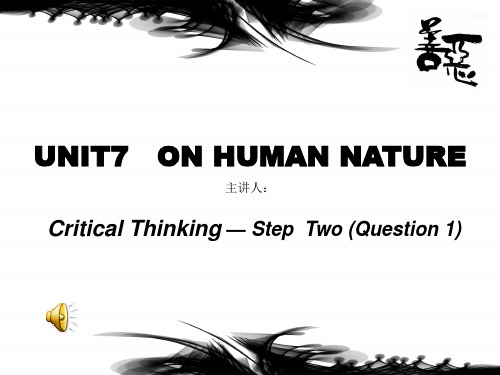
Suggestion:
First, Understanding. Second, Self-control. Third, By thinking small.
THANKS FOR YOUR ATTENTION!
---- THE SIXTH TEAM
Second, Байду номын сангаасelf-control.
People use their self-control to break bad habits and establish good ones, and then life can run smoothly and successfully.
Third, By thinking small.
UNIT7 ON HUMAN NATURE
主讲人:
Critical Thinking — Step Two (Question 1)
CONTENTS:
O Question O View O Suggestion
Question :
As far as schools are concerned, what do you think they can do to make human nature closer to perfection?
As far as school concerned, we should start small.
For instance, by pulling together many small habits ,especially for avoiding temptations and problems, one can get a good human nature.
研究生英语综合教程UNIT7课文及翻译(含汉译英英译汉)
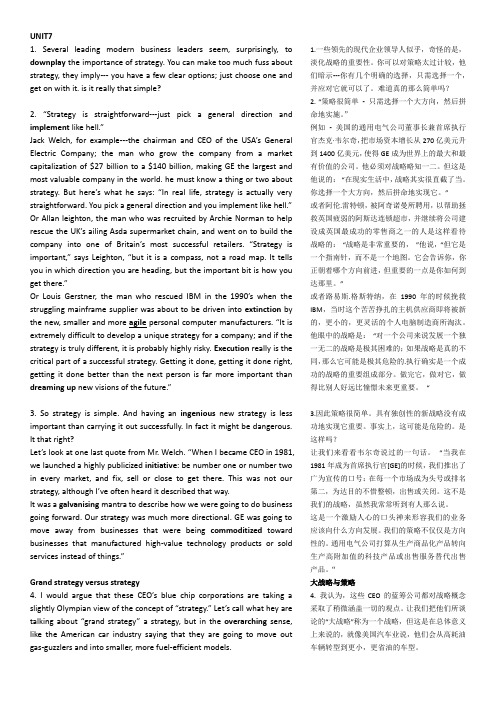
UNIT71. Several leading modern business leaders seem, surprisingly, to downplay the importance of strategy. You can make too much fuss about strategy, they imply--- you have a few clear options; just choose one and get on with it. is it really that simple?2. “Strategy is straightforward---just pick a general direction and implement like hell.”Jack Welch, for example---the chairman and CEO of the USA’s General Electric Company; the man who grow the company from a market capitalization of $27 billion to a $140 billion, making GE the largest and most valuable company in the world. he must know a thing or two about strategy. But here’s what he says: “In real life, strategy is actually very straightforward. You pick a general direction and you implement like hell.”Or Allan leighton, the man who was recruited by Archie Norman to help res cue the UK’s ailing Asda supermarket chain, and went on to build the company into one of Britain’s most successful retailers. “Strategy is important,” says Leighton, “but it is a compass, not a road map. It tells you in which direction you are heading, but the important bit is how you get there.”Or Louis Gerstner, the man who rescued IBM in the 1990’s when the struggling mainframe supplier was about to be driven into extinction by the new, smaller and more agile personal computer manufacturers. “It is extremely difficult to develop a unique strategy for a company; and if the strategy is truly different, it is probably highly risky. Execution really is the critical part of a successful strategy. Getting it done, getting it done right, getting it done better than the next person is far more important than dreaming up new visions of the future.”3. So strategy is simple. And having an ingenious new strategy is less important than carrying it out successfully. In fact it might be dangerous. It that right?Let’s look at one last quote from Mr. Welch. “When I became CEO in 1981, we launched a highly publicized initiative: be number one or number two in every market, and fix, sell or close to get there. This was not our strategy, although I’ve often heard it descri bed that way.It was a galvanising mantra to describe how we were going to do business going forward. Our strategy was much more directional. GE was going to move away from businesses that were being commoditized toward businesses that manufactured high-value technology products or sold services instead of things.”Grand strategy versus strategy4. I would argue that these CEO’s blue chip corporations are taking a slightly Olympian view of the concept of “strategy.” Let’s call what hey are talking about “grand strategy” a strategy, but in the overarching sense, like the American car industry saying that they are going to move out gas-guzzlers and into smaller, more fuel-efficient models. 1.一些领先的现代企业领导人似乎,奇怪的是,淡化战略的重要性。
研究生英语unit_7
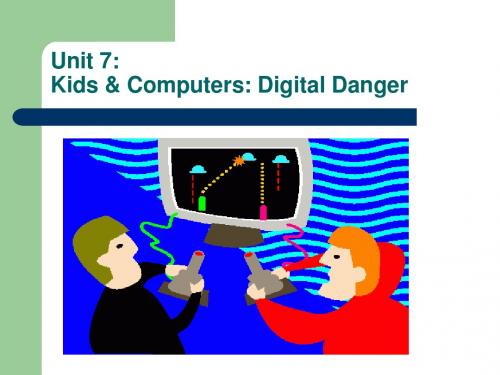
3. When kids sit down to play Monopoly…Contrast this board game scene with one…
Reading Comprehension
A: C B: DBCCD CBABA
Language Studies:A
Text Analysis: Devices for Developing It Giving Examples Making Contrast 1. a ball of Play-Doh…. A video game, on the other hand…. 2. a group of kids are playing a pickup game of soccer… Contrast that scene with the world of the Internet chat rooms…
…a generation raised more ….than… (para. 2)
译文:玩VB和MK电子游戏而不是打棒球玩Uncle Wiggly游戏长大的一代。 在“more...than...”中,肯定“more”后面的而否定 “than”后面的,约等于“是……而不是……”如: This book seems to be more a manual than a text. Catherine is more diligent than intelligent. Hearing the loud noise, the boy was more surprised than frightened.
Text Analysis: Main Idea
Part 1 (1-2): Electronic entertainment can
unit7thetryingtwenties复旦研究生综合英语(1修订版教学课件
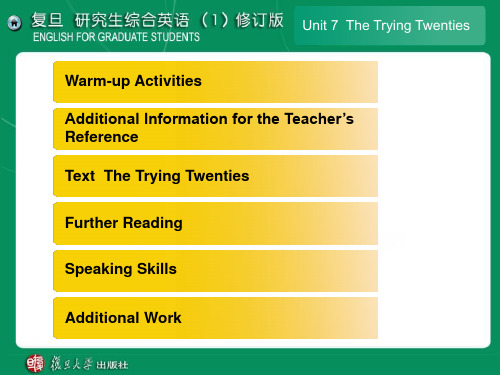
Unit 7 The Trying Twenties
2. How will you describe people in their twenties?
Positive: energetic/incandescent with their energies, impatient to be on their own, eager to find their own way of living in the world, ambitious, brave, curious, adventurous, vivacious, confident, optimistic, cheerful, straightforward Negative: changeable, baffled, confused, lovelorn (sometimes), rash, reckless, immature
Additional Work
Unit 7 The Trying Twenties
Warm-up Activities 1. What does “the trying twenties” mean? Why is the twenties a “trying” period? Here “trying” means straining one’s power of endurance, so the phrase means that the twenties is a period in which people undergo many ordeals that will temper their willpower and make them more mature. Twenty-somethings are presented with numerous tasks which they are not yet equipped to deal with. For example, to prepare for a career, to find a mentor who will guide you through life, to find a mate with whom you will spend your life, etc. These are the things that were once irrelevant, but now have become imminent. In a sense these are the “trials” they need to go through as they are becoming an adult.
研究生学术英语答案Unit-7
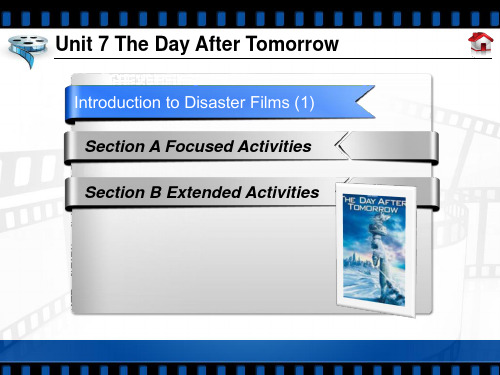
Professor Hall: 7) W__i_th__a_ll_d_u_e_r_e_s_p_e_c_t , Mr. Vice President, the cost of doing nothing could be even higher. Our climate is fragile. 8) _A_t_th_e__r_a_te_ we’re burning fossil fuels and polluting the environment, the ice caps will soon disappear.
Arabian Reporter: I’m 2) c_o_n_f_u_s_e_d . I thought you were talking about global warming, not an ice age.
Section A Part 2 Watching & Listening
Professor Hall: Yes, it is a paradox, but, global warming can 3) t_r_ig_g_e_r a cooling trend. Let me explain. The Northern Hemisphere owes its temperate climate to the North Atlantic current. Heat from the sun arrives at the 4) e_q_u_a_t_o_r and is carried north by the ocean. But, global warming is melting the polar ice caps and 5) d_i_s_ru_p_t_in_g_this flow. Eventually it will shut down, and when that occurs, there goes our warm climate.
研究生英语高级教程unit7译文

参考译文如何应对全球流行病布莱恩•沃什[1]对于墨西哥城这样拥有两千万人口的熙熙攘攘的大都市而言,恢复生机的第一个标志不是公开的宗教仪式,也不是政治集会,而是交通拥堵,这很正常。
为应对甲型H1N1流感的爆发,墨西哥城实施了为期一周的停工停市,终于在五月五日这天重归繁华与喧闹。
猪流感的传播速度已经减缓,这使得墨西哥的政府官员燃起希望,觉得最糟糕的时刻已经过去了。
[2]国际卫生组织的官员也可以稍感放松了。
自从四月底首次出现新型流感病毒报告以来,他们一直处于高度紧张状态。
世界卫生组织和疾病预防控制中心的科学家发现在墨西哥以外鲜有严重或致死的甲型H1N1流感病例,另外也没有足够证据显示疾病会在多数国家持续传播。
[3]那么,世界范围内的关闭学校、边境检测和政府要员召开新闻发布会号召民众勤洗手是大惊小怪吗?很可惜,不是。
正如卫生组织的官员反复强调的,我们现在还处于甲型H1N1流感爆发的初期,而流感病毒的不可预测性是众所周知的。
目前,这种新型流感病毒似乎和普通季节性流感的危险性相差无几,但它可能会在明年冬天以更为致命的方式卷土重来——正如1918年那场造成灾难性后果的大流感一样。
[4]现实情况是,虽然美国和其他国家的卫生部门官员在应对甲型H1N1流感病毒方面进行的广泛合作值得赞扬,但H1N1病毒的出现还只是敲响一个警钟,并不是对我们意志和能力的真正考验。
哥伦比亚大学的美国国家灾难防御中心主任爱尔文•莱德纳尔博士指出:“我们应该把这种新型流感病毒的出现看作是警钟,而不是闹铃。
”[5]在甲型H1N1流感病毒面前,我们这个广泛联系的全球社会对新出现的疾病所显示出的无助暴露无遗。
乘飞机旅行和国际贸易往来使得新型病菌能在不到两周的时间内传播到二十几个国家。
当然,全球化有不利因素也有其优势。
正是全球化使我们能够建立起一个真正意义上的全球疾病监测系统。
全球性流行病的威胁提醒美国人必须对自己老朽过时的医疗卫生系统进行修正。
在传染病爆发的时候,每个人的处境都岌岌可危。
- 1、下载文档前请自行甄别文档内容的完整性,平台不提供额外的编辑、内容补充、找答案等附加服务。
- 2、"仅部分预览"的文档,不可在线预览部分如存在完整性等问题,可反馈申请退款(可完整预览的文档不适用该条件!)。
- 3、如文档侵犯您的权益,请联系客服反馈,我们会尽快为您处理(人工客服工作时间:9:00-18:30)。
Doctor’s Dilemma: Treat or Let Die?Medical advances in wonder drugs, daring surgical procedures, radiation therapies, and intensive-care units have brought new life to thousands of people. Yet to many of them, modern medicine has become a double-edged sword.特效药、冒险的手术、放疗以及重症监护等方面医学进步使成千上万人获得了新生。
然而,对于多数人来说,现代医学成了一把双刃剑。
Doctor’s power to treat with an array of space-age techniques has outstripped the body’s capacity to heal. More medical problems can be treated, but for many patients, there is little hope of recovery. Even the fundamental distinction between life and death has been blurred.医生可以用各式各样的太空时代的医疗技术治疗疾病,而病人康复的能力与之相比却相形见绌。
可以治疗的疾病越来越多,而对于许多病人而言,康复的希望非常渺茫。
甚至生死之间的界限也变得模糊不清了。
Many Americans are caught in medical limbo, as was the South Korean boxer Duk Koo Kim, who was kept alive by artificial means after he had been knocked unconscious in a fight and his brain ceased to function. With the permission of his family, doctors in Las Vegas disconnected the life-support machines and death quickly followed.许多美国人像韩国拳击手金得九一样身陷医学困境。
金得九在一次比赛中遭到重击,不省人事,大脑停止运转,仅靠人工方法延续生命。
后经家人同意,拉斯维加斯的医生中断维持生命的医疗器械,死神接踵而至。
In the wake of technology’s advances in medicine, a heated debate is taking place in hospitals and nursing homes across the country--- over whether survival or quality of life isthe paramount goal of medicine.医学的最终目标是生存呢?还是生命的质量?在医学技术取得进步的背景下,全国的医院和养老院围绕这个问题展开了一场激烈的辩论。
“It gets down to what medicine is all about,” says Daniel Callahan, director of the Institute of Society, Ethics, and the Life Sciences in Hastings-on-Hudson, New York. “Is it really to save a life? Or is the larger goal the welfare of the patient?”“这个问题归根结底在于医学的本质是什么。
”位于纽约哈得孙河畔黑斯挺斯的社会、伦理及生命科学研究所的所长丹尼尔卡拉汉说。
“是挽救生命呢?还是为了病人的幸福?”Doctors, patients, relatives, and often the courts are being forced to make hard choices in medicine. Most often it is at the two extremes of life that these difficulty ethical questions arise --- at the beginning for the very sick newborn and at the end for the dying patient.医生、病人和亲戚,通常还有法庭都不得不做出艰难的医疗选择。
这些艰难的伦理问题通常出现于生命的两个顶端:处于生命开端的重病新生儿以及处于生命末端的临终病人。
The dilemma posed by modern medical technology has created the growing new discipline or bioethics. Many of the country’s 127 medical schools now offer courses in medical ethics, a field virtually ignored only a decade ago. Many hospitals have chaplains, philosophers, psychiatrists, and social workers on the staff to help patients make crucial decisions, and one in twenty institutions has a special ethics committee to resolve difficult cases.这种现代医学技术带来的两难问题催生了一个不断成长的新学科:生物伦理学。
在全国127 家医学院中,有许多现在已经开设了医学伦理学课程。
而仅仅在10 年前,这个领域实际上是被忽视的。
许多医院员工队伍中都出现了牧师、哲学家、心理专家以及社会工作者来帮助病人做出重要的决定。
二十个机构中就有一家成立特别伦理委员会来帮助解决棘手的确案例。
Death and Dying死亡与垂危Of all the patients in intensive-care units who are at risk of dying, some 20 percent present difficult ethical choices--- whether to keep trying to save the life or to pull back andlet the patient die. In many units, decisions regarding life-sustaining care are made about three times a week.在所有重症监护病房的生命垂危的病人中,大约有20% 需要艰难的伦理抉择:是继续挽救生命呢?还是放手不管听天由命?在癌症病房,每周涉及到生死抉择的病例多达三次。
Even the definition of death has been changed. Now that the heart-lung machine can take over the functions of breathing and pumping blood, death no longer always comes with the patient’s “last gasp” or when the heart stops beating. Thirty-one states and the District of Columbia have passed brain-death statutes that identify death as when the whole brain ceases to function.就连死亡的定义都已经发生了变化。
由于人工心肺机可以取代心肺的呼吸和泵血功能,因而死亡也不再是“最后一口气”或心脏停止跳动。
三十一个州和哥伦比亚特区已经通过脑死34超过12 个州承认“前遗嘱”。
More than a dozen states recognize “living wills” in which the patients leave instructions to doctors not to prolong life by feeding them intravenously or by other methods if their illness becomes hopeless. A survey of California doctors showed that 20 to 30 percent were following instructions of such wills. Meanwhile, the hospice movement, with its emphasis on providing comfort --- not cure --- to the dying patient, has gained momentum in many areas.病人“生前遗嘱”要求医生在疾病治愈无望的情况下不要通过静脉注射或其他方法延长生命。
1979 年对加利福尼亚的医生所做的调查显示,当年有20%到 30%的医生遵从了病人的生前遗嘱。
与此同时,一项强调为临终病人提供安适生活而不是医疗服务的临终安养运动在许多地区得到了蓬勃发展。
Despite progress in society’s understanding of death and dying, theory issues remain. Example: A woman, 87, afflicted by the nervous-system disorder of Parkinson’s disease, has a massive stroke and is found unconscious by her family. Their choices are to put her in a nursing home until she dies or to send her to a medical center for diagnosis and possible treatment. The family opts for a teaching hospital in New York city. Tests show the woman’s stroke resulted from a blood clot that is curable with surgery. After the operation, she says to her family: “Why did you bring me back to this agony?” Her health continues to worsen, and two years later she dies.尽管社会对于死亡及生命垂危的理解取得了巨大进步,但是棘手的问题仍然迟迟不能解决。
